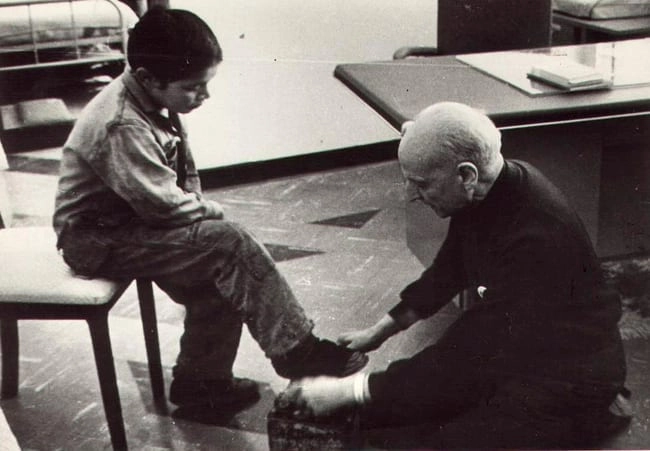This year I am graduating for the fourth time from a Jesuit school. 1 Throughout the past fifteen years, I often heard encouragement from teachers or other students to be “a man for others.” When I was in high school, the phrase often meant having an other-oriented attitude of service, as in, “go on this service trip and be a man for others.” When I was in college, I heard it more often as a call to dedicate my education to the betterment of others. These understandings reflect some of the ways that Jesuit schools have internalized this language of being “for others.”
But the phrase originally was meant to highlight a failure of Jesuit schools. Being a “man for others” was offered as a lofty goal of providing a Christian education that prepared our students to work for justice. Both Jesuits and our alumni were asked to admit humbly that we had not yet achieved that goal. To better understand this common Jesuit mantra, this article will provide a brief history and explore some more recent adaptations that seek to respond to a modern context.
History
In a speech to European Jesuit alumni gathered in Spain in 1973, the Superior General of the Jesuits, Fr. Pedro Arrupe explained what he humbly understood to be the failure of Jesuit schools to form “men for others.” Originally, this speech provoked significant controversy including notorious resignations from some alumni associations as well as severe criticisms in the Spanish press.2 Thankfully, others took up the call to action and received the speech well, including the Vatican Secretary of State, Cardinal Villot, who wrote a letter to Arrupe to express the Pope’s gratitude in calling witness to the Church’s tradition of education for justice.
Almost fifty years later, Arrupe’s words still seem strikingly relevant to our world. The controversy over his speech might be more understandable when we consider current hot button issues in Jesuit schools: abortion and right to life issues, gender expression and sexuality, environmental issues, free speech, or vaccinations and other health regulations. We can and should continue to wrestle with the role of Catholic and Jesuit graduates in these kinds of socio-political conversations. We must ask: what does it mean to be a “person for others” in our local and global contexts today?
Before exploring adaptations and applications of the original phrase, I want to highlight a few areas of Arrupe’s speech to frame this article.
The Speech: Arrupe opened his speech by establishing the context of “education for justice” in the larger Church and the mission of Catholics to act “on behalf of justice and liberation from all oppressive situations.” Then, he introduced his now-famous phrase with the following description, in the original Spanish followed by my direct translation:
“Nuestra meta y objetivo educativo es formar hombres que no vivan para sí, sino para Dios y para su Cristo; para Aquel que por nosotros murió y resucitó; hombres para los demás, es decir, que no conciban el amor a Dios sin el amor al hombre; un amor eficaz que tiene como primer postulado la justicia y que es la única garantía de que nuestro amor a Dios no es una farsa, o incluso un ropaje farisaico que oculte nuestro egoísmo.” 3
My direct English translation:
“Our educational goal and objective is to form men who live not for themselves but for God and for his Christ; for the One who died and rose for us; men for others, that is to say, who cannot conceive of love for God without love for man; an efficacious love that has justice as its first requirement and that is the unique guarantee that our love of God is not a farce or includes Pharisaical clothing that covers our selfishness.”
For Arrupe, it is love for God and Christ that we must express in our love for others. As the first letter of John 4:20 emphasizes, a love for God (who we cannot see) that does not include love for our neighbor (who we can see) is a lie. A “person for others” can be recognized by this kind of love.
Arrupe then posed the most challenging part of this speech (emphasis added):
“I want to respond in all sincerity to a question that for some time has been floating in the air and has no doubt been asked by more than one of you. Have we educated you for justice? Are you educated for justice? Let me try to answer.
If we use the term ‘justice’ and the phrase ‘education for justice’ in the profound sense in which the Church uses those terms today, then I think that we Jesuits in all humility have to give the negative response: we have not educated you for justice in the way that God requires of us in these days.
And I believe I can also ask you to be humble enough to respond likewise: no, you are not educated for justice, and you must still supplement the education you have already received. There is a very profound sense in which we must all be in a process of permanent education.”
Arrupe then spent significant time exploring the Catholic conception of justice, especially through the statements from a 1971 Synod of bishops and Pope Saint Paul VI’s proclamations in Populorum Progressio and Octogesima Adveniens. He sketched out six pairs of complementary theses to be reconciled in our work for justice.4 Overall, he emphasized the role that Catholic education plays in preparing people to do this kind of work.
Finally, Arrupe reviewed the need for ongoing formation for justice and conversion of heart for all of us involved in Jesuit schools. In contrast to a formation process that ends with graduation, the ultimate goal of Jesuit schools is “permanent education”. He elaborated:
“’Men and women for others’ should be persons who are impelled by the Holy Spirit, the Spirit whose anointing will endow them with flexibility and sensitivity in their most inward being. Thus inspired, they will be able to discern, hear, and follow the Spirit’s voice, which will be made manifest to them in the works which the same Spirit accomplishes in the world, in the entire life of the Church, and in their own personal depths. All this will take place in the light of a continual rereading of the Gospel message, which will release little by little, in an unending process, the fullness of its meaning and its demands.”
This work alongside the Holy Spirit, then, is the challenge of being a person for others. It means a constant process of discernment that incorporates all our education, all our experiences, and an awareness of the divine Other with whom we labor. Arrupe’s speech was and is a challenge to Jesuit schools and us graduates to work toward justice more authentically.
Adaptations of the Phrase
Since Arrupe’s initial speech, the phrase continues to be adapted to new contexts. Some examples include:
- Hombres para los demás (Original Spanish)
- Men for others (used mostly in the historical contexts of all-male schools)
- Men and women for others (Arrupe’s acknowledged adaptation)
- Women and men for and with others (to recognize those we work with as agents of change and not simply passive recipients of our charity)
- People for and with others (to include all people as equal partners in this mission)
- Persons for and with all of creation (to recognize our work as part of and alongside the community of all created beings) 5
With all these adaptations, a concern might be that they alter Arrupe’s original message too much. Do these phrases become trite when expanded to include any trendy social issue?
However, my hope is that these developments reflect the intention of the original speech and Arrupe’s vision for our alumni to continue educating themselves. The idea that graduates of Jesuit schools are considering how to best work for justice through these phrases captures the most essential part of Arrupe’s message: that our education is not finished at graduation. That is not a failure of our schools but a call to personal responsibility with maturity and humility.
So which phrase should we use? Ultimately, the spirit of the phrase is more important than the words. It should challenge a deeper engagement with justice rather than serve as a blank space into which we project our concerns. The phrase and our work for justice should transform based on the signs of the times and our development of knowledge. That is the task that faces us as Jesuit graduates and co-laborers for justice.
I invite you to consider: what phrase would represent the kind of person you strive to be as a graduate or person involved with a Jesuit institution? Think about it as your personal mission statement. What phrase challenges you in the constant process of re-education and conversion? That is the phrase you should use and pray with. That might be exactly where God is calling you right now.
-//-
Additional Resources:
https://www.americamagazine.org/content/all-things/time-magazine-men-others
Abbreviated version of Arrupe’s speech: https://onlineministries.creighton.edu/CollaborativeMinistry/men-for-others.html
Expanded version of Arrupe’s speech:
https://jesuitportal.bc.edu/research/documents/1973_arrupemenforothers/
Full Spanish version of Arrupe’s speech:
http://sjweb.info/documents/education/arr_men_sp.pdf
Short Video Summary of “men and women for others”:
https://www.ignatianspirituality.com/what-is-ignatian-spirituality/the-ignatian-way/men-and-women-for-others/
- St. Louis University High School in 2011 and Loyola University Chicago for a BS in 2015, MS in 2017, and PhD in 2022 ↩
- Mesa, J. A. (2017). Ignatian pedagogy : Classic and contemporary texts on Jesuit education from St. Ignatius to today. Loyola Press, p.217. Unless otherwise noted, all English quotations will be taken from this edition. ↩
- Spanish quote taken from the full version of Arrupe’s speech available at: http://sjweb.info/documents/education/arr_men_sp.pdf ↩
- These six theses are well worth reading but beyond the scope of this article. Check the resources for several accessible versions of the speech to consider further. ↩
- Used in the document “Caring for our Common Home: An Ignatian Perspective” available at: https://www.educatemagis.org/wp-content/uploads/2021/08/Caring-for-our-Common-Home_An-Ignatian-Perspective_210910-1631278610.pdf ↩


